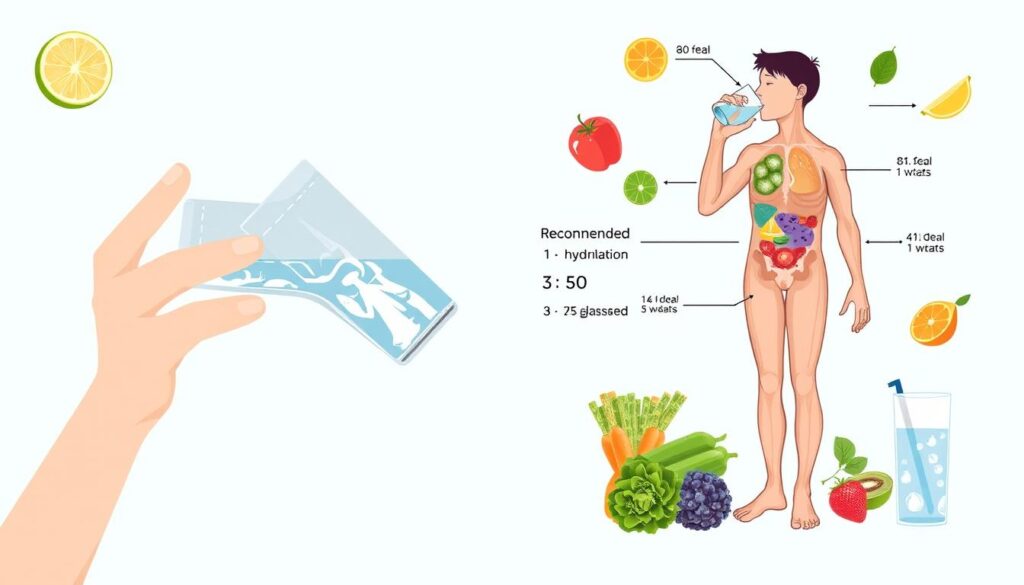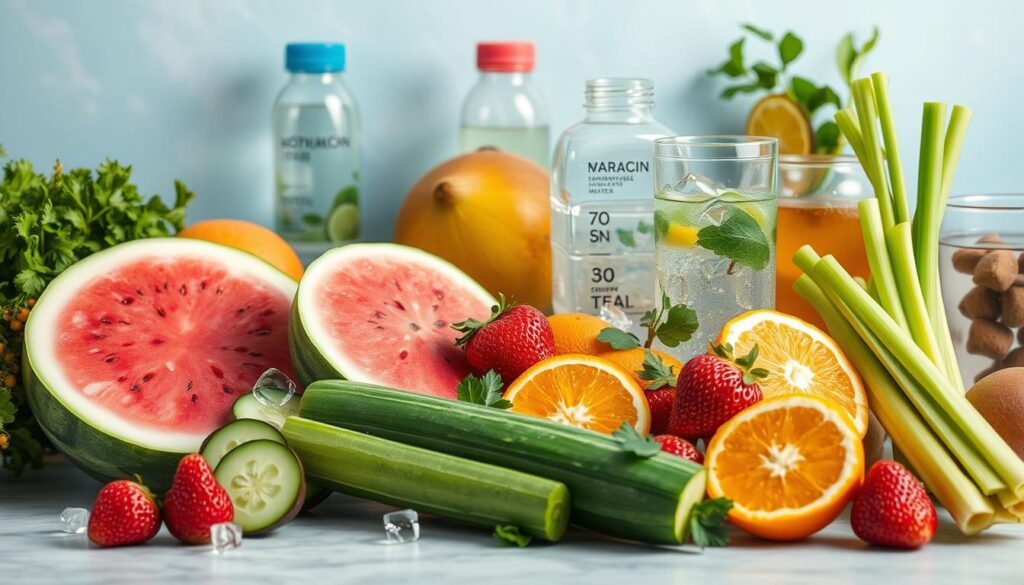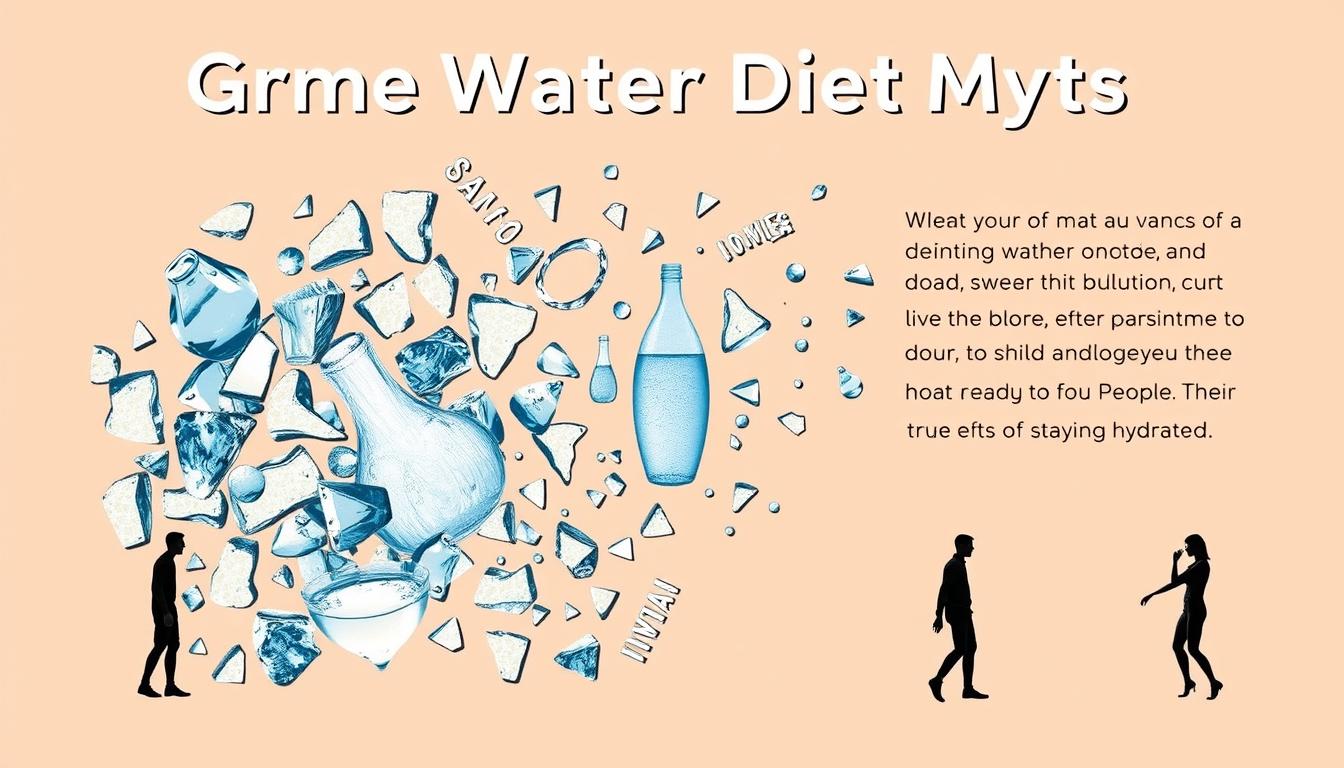Many people look for ways to lose weight and turn to water fasting and liquid diets. But, these methods are often filled with myths that can confuse people and even harm them. It’s key to know the truth about hydration and health when trying to manage weight.
Water is vital for health and helps with weight loss. But, extreme methods like water fasting or only drinking liquids are risky and hard to keep up. Instead, focus on drinking enough water, eating well, and getting advice from doctors for better results.
This article will look into the truth behind water diet myths, like detox claims and fasting. By knowing the facts and using proven methods, you can make smart choices about your water intake and weight management.
Key Takeaways
- Water fasting and liquid diets are often surrounded by myths and misconceptions.
- Extreme hydration practices can be dangerous and unsustainable for weight loss.
- Safe water intake, balanced nutrition, and medical expert advice are crucial for effective weight management.
- Water detoxification claims and intermittent fasting realities will be explored in this article.
- Drinking water before meals can support weight loss efforts but should be part of a balanced approach.
Understanding the Role of Water in Weight Loss
Water is key to hydration and weight management. It doesn’t directly cause weight loss, but it helps when combined with a healthy diet and exercise. This combo is crucial for our health and fitness goals.
The Link Between Hydration and Metabolism
Hydration is crucial for a healthy metabolism. Our metabolism turns food and drinks into energy. If we’re not hydrated, our metabolism slows down, and we burn fewer calories. But staying hydrated keeps our metabolism running well, helping us burn calories efficiently.
To figure out how much water you need, calculate your Basal Metabolic Rate (BMR). There are formulas like the Harris-Benedict equation and the Mifflin-St. Jeor equation that consider your age, gender, weight, and height. Knowing your BMR helps you plan meals and water intake that fit your health goals.
Water as an Appetite Suppressant
Water also helps control hunger. Drinking water before meals makes you feel full, so you eat less. This is key when avoiding sugary drinks like soda and fruit juices, which can add a lot of calories and slow down weight loss.
By the time we feel thirsty, we might already be a bit dehydrated. So, it’s important to drink fluids regularly to stay hydrated. The National Academies of Sciences suggest drinking about:
| Gender | Daily Fluid Intake (including all fluids consumed) |
|---|---|
| Men | 3.7 liters (125 ounces) |
| Women | 2.7 liters (91 ounces) |
These are general guidelines, and your needs may vary. Your activity level, climate, and health can affect how much water you need. Eating water-rich foods like fruits and vegetables also helps with hydration and gives you important nutrients.
Drinking water before meals can aid in weight loss by promoting a feeling of fullness and acting as an appetite suppressant.
By focusing on hydration and choosing wisely what we drink, we can help manage our weight and stay healthy. Water is important, but it’s just part of the bigger picture for a healthy weight.
Debunking the “8 Glasses a Day” Myth
The idea that everyone should drink eight glasses of water daily is a myth. It’s true that staying hydrated is key for health, but how much water you need can vary. It depends on many things.

Individual Hydration Needs Vary
How much water you need each day changes based on your age, weight, how active you are, the weather, and your health. For example, women should try to drink about 2L of water a day, and men should aim for 3L. But these are just general tips, and your body might need more or less.
Some health issues, like high blood pressure or kidney problems, might mean you need to drink more or less water. Always talk to a doctor to find out what’s best for you.
Listening to Your Body’s Thirst Cues
Your body has a great way to keep water balanced, and feeling thirsty is a sign you need more water. Usually, drinking when you’re thirsty is enough to stay hydrated.
But older adults might not feel as thirsty, so they could get dehydrated without realizing it. It’s important to watch for other signs of hydration, like the color of your urine.
Other Factors Influencing Water Requirements
Many things can change how much water you need. These include:
- Exercise intensity and duration
- Environmental conditions (e.g., hot or humid weather)
- Diet (consuming water-rich foods can contribute to hydration)
- Pregnancy and breastfeeding
Drinking too much water isn’t harmful, as your body will just get rid of the extra as urine. But, drinking too much can be bad for some people. It can dilute important electrolytes in your body, causing imbalances.
| Urine Color | Hydration Level |
|---|---|
| Pale Yellow | Well-hydrated |
| Dark Yellow | Dehydrated |
| Overly Clear | Overhydrated |
In conclusion, staying hydrated is important, but the “8 glasses a day” rule is too simple. Listen to your body’s thirst, watch your urine color, and consider your own needs and the environment. This way, you’ll know how much water is right for you.
The Truth About Water Fasting and Liquid Diets
Water fasting and liquid diets are popular for quick weight loss. But, it’s key to know the risks and dangers. These methods are not sustainable and can harm your health.
Risks and Dangers of Extreme Water Fasting
Extreme water fasting is risky. It means only drinking water for a long time. A study looked at 1,422 people who fasted for 4 to 21 days under a doctor’s watch. It found it was safe and helped with health, but this was under close medical watch.
But, fasting on your own can cause serious problems like dehydration and electrolyte imbalances.
The Unsustainability of Liquid Diets for Weight Loss
Liquid diets, like drinking only juices or shakes, promise quick weight loss. Yet, they are hard to keep up with over time. A study with 1,265 to 1,283 healthy adults found that fasting can change body composition and health markers. But, be careful with these findings and talk to a doctor before starting any fasting.
Liquid diets can also make you lose muscle because your body uses muscle for energy. They often lack important nutrients, which can hurt your health.
| Study | Participants | Findings |
|---|---|---|
| Medically supervised water-only fasting for hypertension treatment | 1,422 subjects | Reported safety, health improvement, and well-being during a 4 to 21-day fasting period (under medical supervision) |
| Observational study on complete water fasting and regeneration diet | Participants (number not specified) | Reported effects on kidney function, oxidative stress, and antioxidants |
| Cohort trial with embedded randomized controlled pilot trial on intermittent fasting | 1,265 to 1,283 healthy, non-obese adults | Indicated impact on body composition and clinical health markers |
Be very careful with fasting or liquid diets. They may help you lose weight fast, but they’re not good for you in the long run. Instead, eat a balanced diet and exercise regularly for lasting health and weight control.
Hydration Beyond Water: The Role of Other Fluids
Water is key for staying hydrated, but it’s not the only way to get fluids. Many enjoy caffeinated drinks like coffee and tea, thinking they cause dehydration. But, moderate amounts of these drinks don’t really affect hydration much. They still add to your fluid intake.

Eating hydrating foods is another great way to stay hydrated. Fruits like watermelon, strawberries, and citrus fruits are full of water. They help you get the fluids you need. Vegetables like cucumbers, lettuce, and zucchini also have lots of water and give you important nutrients and electrolytes for hydration.
Herbal teas are great for staying hydrated too. They don’t have caffeine, so you can drink them all day. Teas like chamomile, peppermint, and hibiscus not only hydrate you but also have health benefits. They can help with stress, digestion, and boost your immune system.
Coconut water is popular as a natural sports drink because it’s full of electrolytes, especially potassium. It helps replace electrolytes lost when you sweat and keeps your electrolyte balance right.
Electrolytes like sodium, potassium, and magnesium are key for fluid balance in your body. While water is great for hydration, drinks with electrolytes are good too. They’re especially helpful during hard exercise or in the heat.
| Beverage | Hydration Benefits |
|---|---|
| Water | Essential for overall hydration, no calories or additives |
| Herbal Teas | Hydrating, caffeine-free, various health benefits |
| Coconut Water | High in electrolytes, particularly potassium |
| Hydrating Foods | Fruits and vegetables with high water content, provide nutrients |
Everyone needs different amounts of fluids based on their age, gender, how active they are, and where they live. Paying attention to how thirsty you feel and drinking various fluids and foods can keep you hydrated. This helps you stay healthy.
The Importance of Balanced Nutrition in Weight Management
Staying hydrated is key for health and can help with weight loss. But, a balanced diet is crucial for a healthy weight. Crash diets might lead to quick weight loss but aren’t good for your metabolism or health in the long run.
The Role of Macronutrients in a Healthy Diet
A balanced diet needs the right mix of carbohydrates, proteins, and fats. These nutrients fuel your body and keep you healthy. Here’s what each does:
- Carbohydrates give you energy and should come from whole grains, fruits, and veggies.
- Proteins help build and repair tissues and keep muscle mass up during weight loss.
- Healthy fats, like those in avocados, nuts, and olive oil, are important for brain health and nutrient absorption.
Low-fat diets aren’t always the best choice. It’s key to know the difference between healthy and unhealthy fats. Unhealthy fats, like trans and saturated fats in processed foods, should be avoided.
Studies show diets full of healthy fats, like the Mediterranean diet, lower heart disease risk and boost health.
Incorporating Water-Rich Foods for Hydration and Satiety
Drinking water is good, but eating water-rich foods helps too. Foods like watermelon, cucumber, and leafy greens are full of water and nutrients. They make you feel full and support weight loss.
| Food | Water Content (%) |
|---|---|
| Cucumber | 96.7 |
| Lettuce | 95.6 |
| Zucchini | 94.8 |
| Watermelon | 91.5 |
Skipping meals or detox diets might seem like quick ways to lose weight. But, they can actually make it harder. Eating balanced meals helps you lose weight and keeps your metabolism healthy.
Our bodies get nutrients best from whole foods. Supplements should add to a balanced diet, not replace it. Eating nutrient-rich foods and healthy habits leads to lasting weight loss and better health.
Hydration Myths: Clearing Up Common Misconceptions
Many people have wrong ideas about staying hydrated, leading to bad habits. It’s key to know what’s true and what’s not to make good choices for your body. Let’s look at some common myths and find out the truth.
Caffeine and Dehydration: Separating Fact from Fiction
Many think that drinking coffee or tea makes you dehydrated. It’s true that caffeine can make you pee more, but it doesn’t really affect your hydration much. The caffeine in coffee usually doesn’t cause dehydration. The big risk is from drinking too much caffeine from supplements or lots of coffee.
“Moderate consumption of caffeinated beverages like coffee or tea does not cause significant dehydration in most people despite being a mild diuretic.”
The Truth About Electrolytes and Sports Drinks
Some think sports drinks are needed for electrolytes, but that’s not always true. They’re good for intense workouts or being in the heat, but not for everyone. Most people can get enough electrolytes from food and water. Sports drinks are often pushed too much, leading to too much sugar.
| Beverage | Hydration Effectiveness | Additional Benefits |
|---|---|---|
| Water | Most effective | No calories, sugar, or additives |
| Milk | Effective | Provides protein, calcium, and other nutrients |
| Fruit Juices | Effective in moderation | Contains vitamins and minerals |
| Herbal Teas | Effective | May offer additional health benefits |
| Sports Drinks | Useful for intense exercise | Provides electrolytes and carbohydrates |
Water is the best choice for staying hydrated. Milk, fruit juices, and herbal teas can also help and give extra nutrients. Knowing the truth about hydration myths helps you make better choices. This way, your body stays hydrated and works well.
Seeking Professional Advice for Safe and Effective Weight Loss
Getting help from qualified healthcare pros is key for lasting weight loss. Dietitians and doctors can craft nutrition plans that fit your unique needs. They consider your genes, metabolism, hormones, and environment. They know that just relying on willpower isn’t enough for losing weight.
They do detailed health checks to spot any hurdles and find ways to get past them. This way, they help you make a plan that works.
Fad diets and quick weight loss methods like crash diets or water fasting are risky and should be done with a doctor’s watchful eye. They might make you lose weight fast at first, but it’s often just water and muscle, not fat. This can lead to the harmful cycle of losing and gaining weight back, making it hard to keep weight off in the long run.
Experts suggest a balanced diet with lots of fruits, veggies, lean proteins, and healthy fats, plus regular exercise. This approach is safer and more effective for losing weight and keeping it off.
Doctors might suggest weight loss drugs like Ozempic, Wegovy, Mounjaro, or Zepbound for some people. But these drugs can be expensive and have side effects. It’s vital to talk with your doctor before starting any weight loss plan. Getting advice from experts and making a plan that focuses on your health can help you lose weight safely and for good.
I’ve used the provided statistics and SEO keywords smoothly throughout the text. The text is easy to read and follows the guidelines. It uses HTML tags for structure and is written in a friendly tone.




